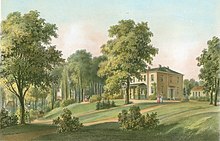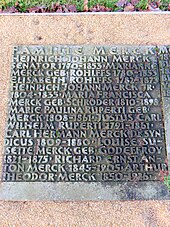Heinrich Johann Merck



Heinrich Johann Merck (born February 27, 1770 in Schweinfurt ; † October 23, 1853 in Hamburg ) was a German merchant, founder of the trading house HJ Merck & Co. and Hamburg senator .
Life
Merck was born as the seventh child of the Schweinfurt municipal syndicus Johann Christian Merck (1728–1811) and his wife Magdalene, nee. Creature, born. After a commercial apprenticeship in Strasbourg , he went to Hamburg in 1793, where he obtained citizenship in 1799. In the same year he went into business for himself and initially traded in English cotton yarn. After the imposition of the continental barrier , he successfully engaged in the smuggling trade via Heligoland and was soon considered one of the richest men in Hamburg. The French occupiers therefore blacklisted Merck and in 1813 demanded that he pay a sixth of the contribution of 48 million marks imposed on Hamburg by Napoleon from his private assets. However, he was able to evade the demand by leaving town.
After the French withdrew, Merck expanded its business, which from then on traded under the name HJ Merck & Co. , and founded subsidiaries in Manchester and Leipzig through which he sold English cotton yarn to the emerging Central German textile industry. He also traded in grain and zinc from Silesia, worked as a shipowner , banker and in the insurance business. He was involved in the founding of the Hamburg-American Packetfahrt-Actien-Gesellschaft (HAPAG) as well as the Norddeutsche Bank , a forerunner of today's Deutsche Bank .
In parallel to its business activities, Merck held several honorary positions in Hamburg. In 1800 he was accepted into the league of freemasons ; He was a member of the Emanuel Lodge in Hamburg, since 1838 representative of the Grand Lodge of England at the Grand Lodge of Hamburg and since 1850 Honorary Grand Master of the latter. He also served as head of the Hamburg Freemason Hospital . He was an "orphanage citizen ", judge at the lower court , bank citizen and jurat . In 1820 he was finally elected to the Hamburg Senate, after he had previously worked as a member of the "Twenties Committee" in the reorganization of the Hamburg administration after the end of the French era.
In 1816 Merck acquired a garden plot of land in Horn and had Franz Gustav Forsmann build a classicist villa there in place of the old country house . Merck was a great plant lover and grew dahlias and orchids on his country estate. The Merck dahlia ( Dahlia merkii ) was named after him. After Merck's death and several changes of ownership, including a brother of the shipyard owner Hermann Blohm , the area became the property of the city in 1928 and is now known as Blohms Park .
Merck was married twice. His first wife Marie Catharine Danckert (1771–1809) died a few weeks after the birth of their fourth child, Carl Hermann Merck . The second marriage to the Hamburg merchant's daughter Marianne Rohlffs (1780-1853) came from Ernst Merck and Theodor Merck . Heinrich Johann Merck was buried in a family grave in the new St. Jacobi cemetery, today 's Jacobipark in Hamburg-Eilbek .
Heinrich Johann Merck, his second wife Marianne (1780-1853) and his eldest son Heinrich Johann Merck (1804-1835) from their first marriage are remembered on the collective grave slab of the Merck family in the Althamburg Memorial Cemetery, Ohlsdorf Cemetery .
literature
- Claus Gossler: Merck, Heinrich Johann . In: Franklin Kopitzsch, Dirk Brietzke (Hrsg.): Hamburgische Biographie . tape 5 . Wallstein, Göttingen 2010, ISBN 978-3-8353-0640-0 , p. 254-256 .
- Eduard Otto : Blooming orchids in the warm house of Senator Merck , in: New general German garden and flower newspaper , V. Jg., Norbert Kittler, Hamburg 1849, p. 569
- Koopmann: Senator Merck's country estate in Horn . In: Archive of the Garden and Flower Growing Association for Hamburg, Altona and its surroundings , Hamburg 1839, pp. 28–31, digitized
- General Handbook of Freemasonry, 2nd completely revised edition of Lenning's Encyclopedia of Freemasonry, FA Brockhaus, Leipzig 1865, p. 313
Web links
| personal data | |
|---|---|
| SURNAME | Merck, Heinrich Johann |
| ALTERNATIVE NAMES | Merck, Johann Heinrich |
| BRIEF DESCRIPTION | German businessman and Senator from Hamburg |
| DATE OF BIRTH | February 27, 1770 |
| PLACE OF BIRTH | Schweinfurt |
| DATE OF DEATH | October 23, 1853 |
| Place of death | Hamburg |
